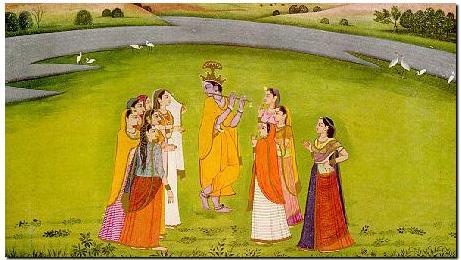

Unit 6

English 203:
Literature of the NonWestern World
 |

Unit 6 |

English 203: Literature of the NonWestern World |
| Introduction | .Explication | Questions | Review |
Review:
Sakuntala:
There is little to remember in regard to the plot. Sakuntala & the king are both a bit too impetuous. As a gloss for Hinduism the lesson is that our uncontrolled emotions are liable to involve us in maya, to rile up our emotions & get us tangled in games & situations that ultimately cause more suffering than they are worth. The release from such illusion is also characteristically Hindu. Specifically the play suggests the jnana marga. The king is instantly awakened to his true identity (Atman) by the sight of the ring. His insight entirely releases him from illusion.
I hope you retain some positive feeling about Kalidasa & formal drama. Don't dismiss it before you have a taste. It might be better than you expect.
Bhakti:
You should remember the term "bhakti" to denote a religious outlook or technique; one that exclusively relies on the depth & sincerity of emotion. Typically Hindu bhaktas characterize the soul as a love-sick young woman who would sacrifice anything, including her moral reputation & even sanity, to achieve union with her beloved.
Bhaktas typically came from the lower castes & offered tacit, often explicit, criticism of religious formalism that was in the proud care of high caste Brahmins. The Bhaktas charged that if your heart was not moved by the love of God, then formal rituals were empty & meaningless.
Contemporary productions of Kalidasa's plays are rare & one suspects almost prohibitively expensive & difficult to stage because of the many talents required. Bhakti songs, chants, & poetry are immensely popular throughout present day India.
Islam -- or at least a large part of the program
-- adopted the Hindu method of bhakti in the outlook & practice
of Sufism that we will recognize in the story written by the Egyptian Naguib
Mahfouz.
This is the end of unit 6 & our too brief
study of India. Next week we will visit Japan to walk with the Buddhist,
Basho on his pilgrimage to the "Deep North." See you
next week.